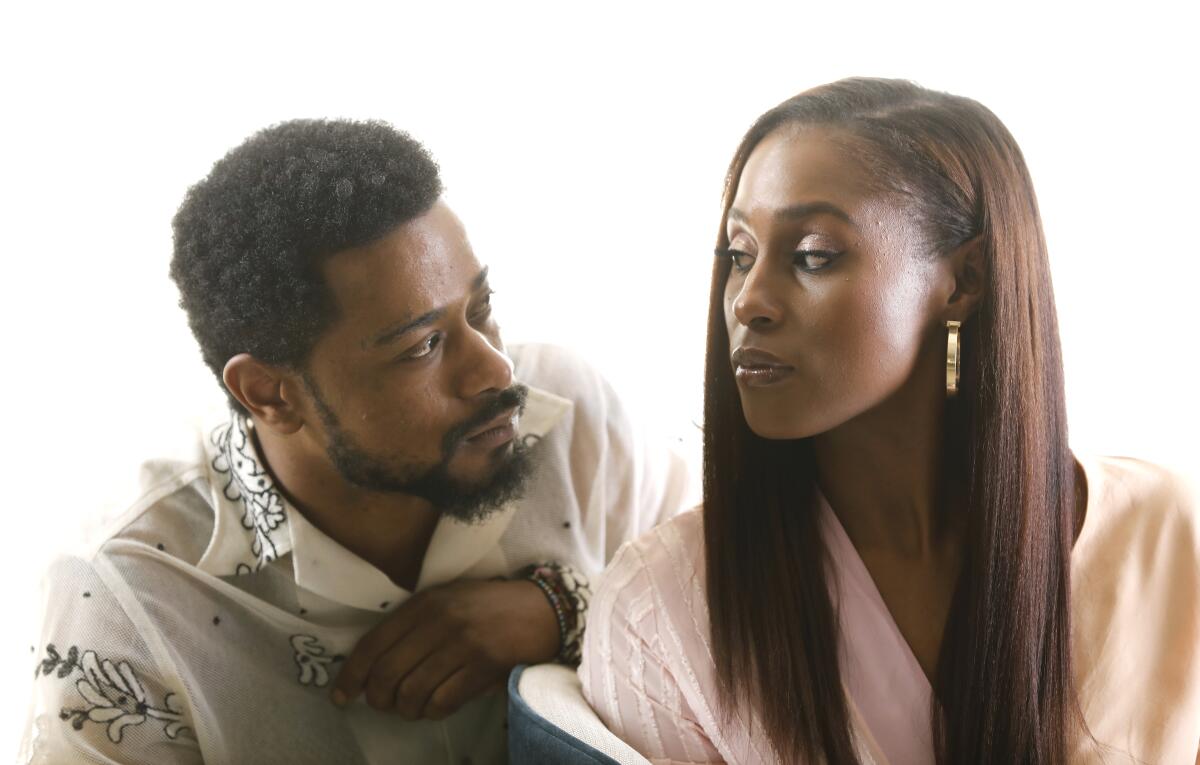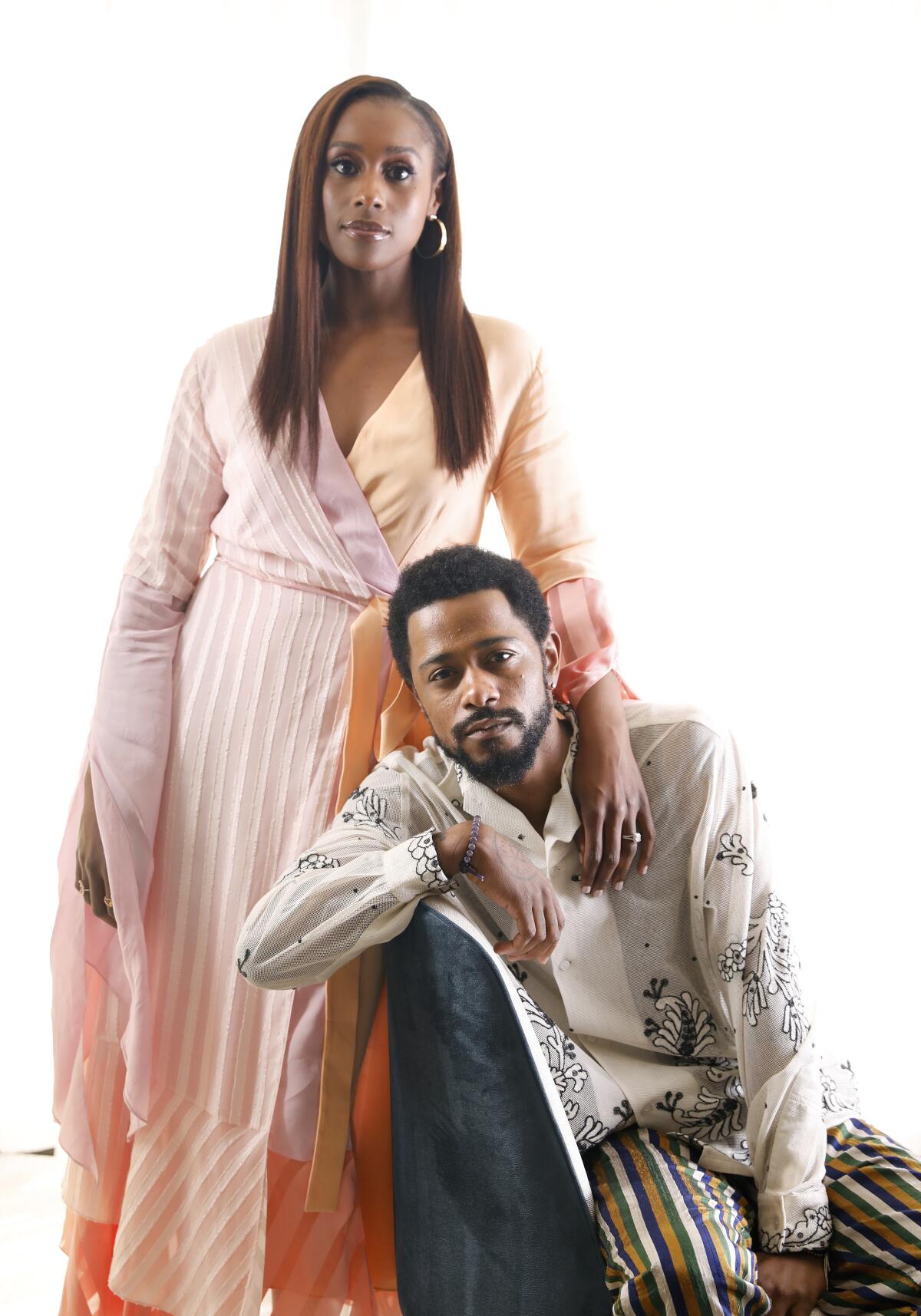With ‘The Photograph,’ Issa Rae and Lakeith Stanfield revive the black romantic drama

- Share via
The ’90s and early aughts were a golden era for black cinema, in particular the black romantic drama.
With the release of films like “Brown Sugar” (2002), “How Stella Got Her Groove Back” (1998), “Deliver Us From Eva” (2003), “Two Can Play That Game” (2001) and “The Best Man” (1999), representation for varying shades of black love was at an all-time high.
Genre classics like “Love Jones” (1997) and “Love & Basketball” (2000) left an indelible mark on black filmmakers, the echoes of which can be seen on-screen today.
For writer-director Stella Meghie — who offers her own entry into the genre this weekend with Universal’s “The Photograph,” starring Issa Rae and Lakeith Stanfield — “Love & Basketball,” a Sanaa Lathan and Omar Epps sports romance, presented a rare opportunity for her to see her own experience reflected in a major studio release.
“Before I knew I wanted to direct, I was just so connected to that film,” said Meghie. Director Gina Prince-Bythewood “saw me: ‘Ball’ was life for me growing up and I was fighting that feeling of being a tomboy. I remember the year in high school when I decided to wear a skirt, so I just related to Sanaa’s character so much.”
“I’ve always said ‘Love & Basketball’ influenced me wanting to be a writer and a filmmaker,” said Rae. “There’s something about watching people fall in love that feels magical, maybe because I think I’ve been more cynical in real life. To learn love from movies is problematic, but also wistful. It’s wish fulfillment.”
In “The Photograph,” Rae plays a museum curator named Mae who finds herself grappling with the recent loss of her elusive and estranged mother. Stanfield costars as Michael, a journalist who inadvertently helps Mae connect the dots of her past, falling in love with her in the process.
The multigenerational story (Chanté Adams plays Mae’s young mother alongside Y’lan Noel as her first love) was intended to be a meditation on black love and the barriers to it that we both inherit and create ourselves.
“For me, the message about love in this film is that there’s a history to it,” said Meghie. “That your ability to love comes from what you’ve learned about love, how your parents loved and how those relationships between mothers and daughters affect your emotional intelligence.”
“I always thought about it in terms of DNA,” said Stanfield. “And how generations pass on information unwillingly to their offspring, and the trauma lives in the blood and the experience.”
And the black experience is rife with trauma. The legacy of slavery still affects African Americans to this day, coloring everything from our position in society to how black men and women interact with each other.
“I think it impacts everything,” said Meghie. “Going through slavery and having families ripped apart affects your ability to trust. You don’t get rid of that kind of trauma. It doesn’t feel as traumatic and painful as it did [then] but it’s the remnants of it that affect how you are able to decide to stay with somebody and if you even can.
“If your parents divorce, that’s going to affect how you feel about love. If you’re walking around with your baggage and not talking about it, or going to therapy, you might pretend it’s not affecting you, but it absolutely is.”
“It’s a unique thing to be cut off from where you came from,” agreed Rae. “The fact that so many other cultures take for granted that they can trace their lineage back hundreds of thousands of years while ours gets cut off after a certain point is traumatic. Not having access to generational wealth, not having access to your roots is traumatic enough but to be constantly told to get over it ... even if it doesn’t consciously affect you, it affects you.”
While developing the story with Universal and Will Packer Productions, Meghie drew narrative inspiration from her own life after witnessing her grandmother reunite with a daughter she hadn’t seen in nearly 40 years.
“My grandmother had given her up when she was really young,” said the director. “And it had been almost 40 years since they had [last] seen each other or spoken. She was going through all these emotions of regret and excitement, shame and fear. And it was just so interesting to me because my grandmother was all of a sudden a young woman again confronting her past. I had never seen her like that before.”
“I was like, imagine having all this time pass and every day thinking about this person but not talking to them,” she added. “I ended up coming back to this idea of a burgeoning couple spending this Hurricane Sandy evening together and how that could pull them together or break them apart.”
“I thought the multigenerational story was great,” said Rae. “And I missed seeing black romance stories on the screen. It’s something that we’d been discussing for a long time just within my friend group. So to be a part of something like this felt like an honor.”
“I was quite drawn to the story,” agreed Stanfield. “My desire was to get into the love genre but in a way that reflected my love and my past loves with black women. It’s nice to see cinema finally starting to catch up and it’s because people like Will Packer and Stella are taking a chance. It’s going to continue to take that for us to continue to blossom.”

Despite a push for greater diversity across the board, the black romantic drama — indeed romances of all kinds — have waned in the last decade as studios have rushed to capitalize on the popularity of big budget superhero movies. As Hollywood trends tipped toward big budget spectacles and midrange horror fare, black romance movies and rom-coms have fallen by the wayside.
“I think the movie industry in general isn’t really embracing smaller movies,” said Rae. “I think people have missed them, but they usually go straight to Netflix or cable.”
“I don’t know why [but] I think it’s easier to market [straight] comedies,” said Meghie. “It’s just easier to sell them and easier to make them successful. Romantic dramas are complex and subtle and nuanced and that can be hard to get across in two hours.”
That nuance and reliance on character development and story progression are why the director takes personal offense when romance and romantic movies are written off as being cheesy or cloying.
“I’ll see tweets that talk about romance like it’s a guilty pleasure or that it’s corny,” said Meghie. “This girl the other day was like, ‘Oh, I love a mushy film.’ And to me, that was like a bad word. People base their whole lives on family and marriage so the idea that romance and romantic dramas are not serious ... these are emotions that we’re trying to get through to be happy, functional human beings, to procreate, and that is important.
“When I see people talking about romantic dramas or the genre like it’s not worthy of being taken seriously, that’s just sexism to me. That’s just talking down to the female audience and not valuing them. That’s men refusing to be in touch with their emotions and face why the hell they can’t stay in a relationship. I’m always so annoyed by that.”
The reason people are so afraid to bare their hearts in love may be the same reason more people (men especially) are reluctant to embrace the romance genre or to take it seriously: fears relating to intimacy and vulnerability.
“To really love someone you have to be open and allow them to possibly judge you,” said Meghie. “And if you’re not willing to show the worst parts of yourself you can’t be in love.”
“It’s a scary thing to be vulnerable,” said Rae. “I think now within our generation it’s getting harder to put yourself out there face to face. Love is a very intimate thing. I think the more we become ‘connected,’ the harder it is to fully acknowledge and express your feelings. You have to be brave to outwardly and openly love.”
As with her character in the film, Rae admits she hasn’t always had that kind of courage in her romantic relationships.
“I grew up looking at my parents’ marriage as an example of what I wanted to aspire to,” she said. “And then when they split up, I was observing how my mother dealt with it and seeing that hurt and began embodying that I never wanted to depend on anybody. Obviously that’s a harmful way of thinking if you do plan to be in a relationship. A lot of my time has been spent undoing that. There’s a strength in growing with and building with someone, even if it doesn’t work out in the end.”
Stanfield also managed to find commonality with his character’s experience as well as to the notion of passing down generational curses — or being the first person in the family to break them.
“I lived in a very fragmented situation where [my parents] were never together,” he said. “I actually never saw my parents a lot when I was growing up, but I grew up around women. And the women that were around were black women who were done with men. I hadn’t seen any idea of what a real love relationship looked like and by the time I did start seeing it, it was only negative. Things where men with small hearts were abusing women. And so I had to kind of figure out on my own what my relationship dynamic would look like.”

A sweeping love story about forgiveness, and about finding the courage to seek the truth, no matter where it may lead you.
While fleshing out the characters’ backstories, Meghie decided to write what she knew. She decided her leads would be young professionals in the middle- to upper-middle-class range (a rarity for black characters on screen) to reflect her own experience growing up in Canada.
“I grew up with a pool in the suburbs so I guess it reflects my upbringing and what I know,” she said. “I just think there’s not enough black films so it starts to feel like [life is] just one way because just one kind of movie is getting greenlit. And so it’s important to show all aspects of life, even if it’s aspirational.”
“She for sure wanted a very specific aesthetic and [to depict] a very specific black experience,” said Rae, whose signature natural curls were blow-dried straight for the film (“I do feel duped,” she said). “But the love story itself is meant to be universal. I think it’s nice to see [a well-to-do black love story] but also don’t want to conflate this as the sole representation of black love. I’d love to see what other stories this opens up.”
“I think there’s a stereotype built into [the idea of] what it means to be black in this country,” said Stanfield. “A lot of that has to do with depictions in cinema and stage and show. It’s dope that we’re able to stand up on our own two [feet] and say, ‘No, this is who we are and who we’ve been.’ It’s a beautiful thing.
“We’re young in cinema where we’ve got the chance to tell and be a part of our own stories,” he added. “We’re going to continue to just expand [representation] and I’m excited to see it. By virtue of that, everybody else can [begin to] tell their stories.”
More to Read
Only good movies
Get the Indie Focus newsletter, Mark Olsen's weekly guide to the world of cinema.
You may occasionally receive promotional content from the Los Angeles Times.











